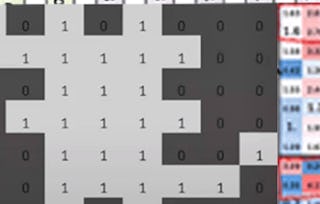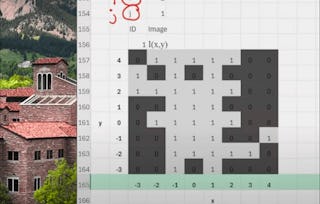In this course, we will expand on vision as a cognitive problem space and explore models that address various vision tasks. We will then explore how the boundaries of these problems lead to a more complex analysis of the mind and the brain and how these explorations lead to more complex computational models of understanding.

Gain next-level skills with Coursera Plus for $199 (regularly $399). Save now.

Computational Vision
This course is part of Mind and Machine Specialization

Instructor: David Quigley
5,309 already enrolled
Included with
(66 reviews)
What you'll learn
Apply various models of human and machine vision and discuss their limitations.
Demonstrate the geon model of object recognition and its limitations.
Argue the benefits and drawbacks of the symbolist and visualist perspectives of mental imagery.
Recognize the single layer and multi-layer perceptron neural network models of artificial intelligence.
Skills you'll gain
Details to know

Add to your LinkedIn profile
5 assignments
See how employees at top companies are mastering in-demand skills

Build your subject-matter expertise
- Learn new concepts from industry experts
- Gain a foundational understanding of a subject or tool
- Develop job-relevant skills with hands-on projects
- Earn a shareable career certificate

There are 4 modules in this course
This week we will explore some basic assumptions of a simple model of human vision.
What's included
1 video1 reading1 assignment
This week we will explore models of higher-order tasks solved by the visual system.
What's included
3 videos2 assignments3 discussion prompts
This week we will compare and contrast different perspectives of how mental imagery relates to the visual system.
What's included
2 videos1 reading1 assignment
This week we will explore the neuron as an element of the human cognitive system and ways we can implement these pieces into neural network systems of artificial intelligence.
What's included
3 videos1 reading1 assignment
Earn a career certificate
Add this credential to your LinkedIn profile, resume, or CV. Share it on social media and in your performance review.
Instructor

Offered by
Explore more from Algorithms
 Status: Free Trial
Status: Free TrialColumbia University
 Status: Free Trial
Status: Free TrialUniversity of Colorado Boulder
 Status: Free Trial
Status: Free TrialUniversity of Colorado Boulder
Why people choose Coursera for their career




Learner reviews
66 reviews
- 5 stars
59.09%
- 4 stars
28.78%
- 3 stars
9.09%
- 2 stars
0%
- 1 star
3.03%
Showing 3 of 66
Reviewed on Mar 14, 2021
Very nice course but needs to include more instructiveness with lots of examples.
Reviewed on May 29, 2021
Good understanding of mechanism of computer vision through deep learning
Frequently asked questions
To access the course materials, assignments and to earn a Certificate, you will need to purchase the Certificate experience when you enroll in a course. You can try a Free Trial instead, or apply for Financial Aid. The course may offer 'Full Course, No Certificate' instead. This option lets you see all course materials, submit required assessments, and get a final grade. This also means that you will not be able to purchase a Certificate experience.
When you enroll in the course, you get access to all of the courses in the Specialization, and you earn a certificate when you complete the work. Your electronic Certificate will be added to your Accomplishments page - from there, you can print your Certificate or add it to your LinkedIn profile.
Yes. In select learning programs, you can apply for financial aid or a scholarship if you can’t afford the enrollment fee. If fin aid or scholarship is available for your learning program selection, you’ll find a link to apply on the description page.
More questions
Financial aid available,






